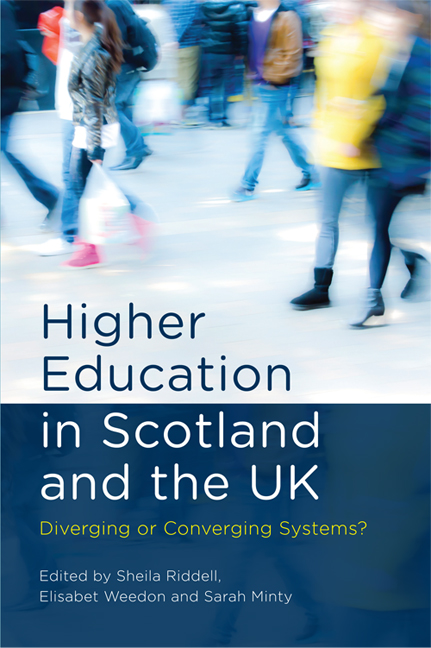Book contents
- Frontmatter
- Contents
- Figures
- Tables
- Acknowledgement
- The Contributors
- Dedication
- 1 Scottish Higher Education and Devolution
- 2 Higher Education Governance and Institutional Autonomy in the Post-devolution UK
- 3 Student Funding in the UK: Post-Devolution Scotland in a UK Context
- 4 Young People–s Attitudes towards Student Debt in Scotland and England
- 5 Cross-border Flows of Students within the UK
- 6 Widening Access to Higher Education in Scotland, the UK and Europe
- 7 The Internationalisation of Higher Education in Scotland and the UK
- 8 Research Policy in Scotland and the Rest of the UK
- 9 Devolution and Higher Education Policy: Negotiating UK and International Boundaries
- Appendix 1 Research Methods
- Appendix 2 List of Acronyms
- Index
5 - Cross-border Flows of Students within the UK
Published online by Cambridge University Press: 05 August 2016
- Frontmatter
- Contents
- Figures
- Tables
- Acknowledgement
- The Contributors
- Dedication
- 1 Scottish Higher Education and Devolution
- 2 Higher Education Governance and Institutional Autonomy in the Post-devolution UK
- 3 Student Funding in the UK: Post-Devolution Scotland in a UK Context
- 4 Young People–s Attitudes towards Student Debt in Scotland and England
- 5 Cross-border Flows of Students within the UK
- 6 Widening Access to Higher Education in Scotland, the UK and Europe
- 7 The Internationalisation of Higher Education in Scotland and the UK
- 8 Research Policy in Scotland and the Rest of the UK
- 9 Devolution and Higher Education Policy: Negotiating UK and International Boundaries
- Appendix 1 Research Methods
- Appendix 2 List of Acronyms
- Index
Summary
INTRODUCTION: WHY DO CROSS-BORDERFLOWS MATTER?
Around one in fourteen UK residents who enter full-time undergraduate courses move to a different home country of the UK to do so. In this chapter we examine the types of students who move, their reasons for doing so, and the trends and patterns of what we shall call ‘cross-border flows’. We also reflect on the ways in which devolution and related changes have influenced these flows. We start by considering why cross-border flows matter.
First, they matter for students and institutions. They allow students to access a wider range of higher education courses than may be available within the home country. They may provide educational benefits, broadening the horizons of the students who move. They may also benefit the institutions which these students enter, and the other students who attend them, by increasing the diversity of the student body. However, they thereby raise questions of fairness and equality of access. Many students may lack the resources, knowledge and confidence to consider and take up opportunities in a part of the UK in which they are not normally resident. Conversely some students, especially from Northern Ireland, may have to be mobile in order to access higher education (HE) at all. And if institutions only attract a socially unrepresentative group of students from the rest of the UK (rUK students), the benefits in terms of student diversity will be lost. Even when rUK students do enhance the diversity of institutions’ intakes, the benefits are not spread equally across institutions, some of which attract much higher proportions of rUK students than others.
Cross-border flows also matter to governments, and especially the devolved administrations, where they account for a much larger proportion of total student numbers than for England. They have implications for the supply of skilled manpower: students who leave the home country to study may not return when they have qualified. They have implications for the resourcing of universities and for the sustainability of the devolved administrations’ diverging funding arrangements. The devolved administrations have not increased fees for their own students to the same extent as in England, but they have charged English-level fees for rUK students and the fee income from these students has helped to alleviate funding pressures.
- Type
- Chapter
- Information
- Higher Education in Scotland and the UKDiverging or Converging Systems?, pp. 71 - 89Publisher: Edinburgh University PressPrint publication year: 2015



